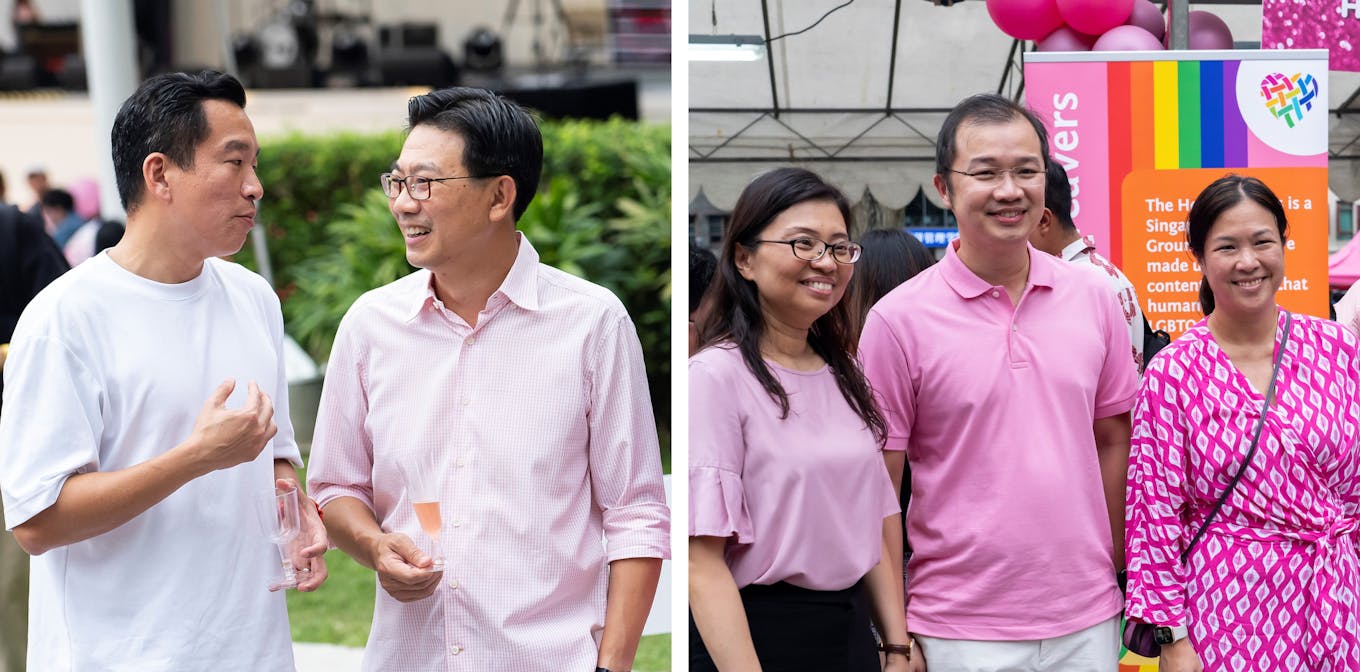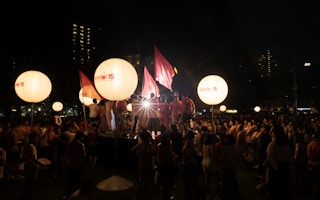When Singapore decriminalised sex between men last year, many in the LGBTQ community considered it a bittersweet win.
To continue reading, subscribe to Eco‑Business.
There's something for everyone. We offer a range of subscription plans.
- Access our stories and receive our Insights Weekly newsletter with the free EB Member plan.
- Unlock unlimited access to our content and archive with EB Circle.
- Publish your content with EB Premium.
The nation had in parallel strengthened the definition of marriage as between man and woman via constitutional changes – a move the government said reflected societal preference.
Advocates are now working to shift such preferences. At Singapore’s annual “Pink Dot” rally, the biggest LGBTQ movement in the city-state, campaigners called for support for non-traditional family unions.
“We ask you to imagine, to create your families on your terms,” said Cally Cheung, director of LGBTQ community group Prout. Robin Lim, a father invited to speak about having a gay son, called on parents not to stand in the way of their child’s sexual identity.
The difficulty in garnering broader societal acceptance for the LGBTQ community in Singapore mirrors the general reluctance across Asia to adopt a more liberal view of gender equality. Out of over 30 jurisdictions worldwide that recognises same-sex marriage, only one – Taiwan – is in Asia.
Hong Lim Park, a 1-hectare field downtown that is the only available space for legal demonstrations in Singapore, was mostly packed to capacity on Saturday (24 June). Pink Dot organisers did not provide a turnout figure.
Clement Tan, Pink Dot spokesperson, said the campaign this year sought to dispel the notion that LGBTQ equality is a threat to family values – an argument that had been amplified last year as the country repealed “Section 377A” of its penal code that dealt with gay sex.
Tan said the LGBTQ community is most concerned about bullying, along with barriers to starting families and buying homes, citing a study Pink Dot commissioned and will release later this year.
Participants at the rally said they believe greater societal acceptance is possible but will be slow.
Banking professional Ishani Banerjee, 38, said getting people to think more openly about families was a “significant first step”, but hoped for more support in areas like housing for LGBTQ couples.
Currently, same-sex couples can only buy housing as singles, which excludes them from getting subsidised government apartments until 35 years old. Certain public flats in prime estates are also off-limits to them, after a 2021 policy update.
Investment manager Kevin Yiew said it would be “unlikely” that the government will “get involved and say we are not a menace to society”, unless more supportive policymakers are voted in in future elections.
The 27-year-old, who identifies as gay, said he hopes the government would recognise same-sex couples who legally register their marriage overseas and extend family benefits to them back in Singapore.
Largest political turnout
Five politicians from three parties attended Pink Dot on Saturday, the highest attendance from lawmakers in the rally’s 15-year history. None suggested new policy initiatives when asked, saying they are instead hearing out different groups on LGBTQ issues.

Lawmakers at the Pink Dot rally. From left: Eric Chua, senior parliamentary secretary for culture, community and youth, and for social and family development; member of parliament Derrick Goh; opposition non-constituency member of parliament Hazel Poa from the Progress Singapore Party; opposition member of parliament Louis Chua from the Workers’ Party, and opposition member of parliament He Ting Ru from the Workers’ Party. Images: Eco-Business/ Liang Lei.
Two members of the ruling People’s Action Party, Eric Chua and Derrick Goh, were present in personal capacities.
Chua, senior parliamentary secretary for the culture, community and youth ministry, and the social and family development ministry, told reporters the government wants to represent a “broad swathe” of Singapore society.
“If [government policy] evolves, it will do so according to how society evolves,” he said.
Opposition member Hazel Poa, from the Progress Singapore Party, said public housing policy could be more inclusive, and less centred on the family nucleus. Louis Chua and He Ting Ru of the Workers’ Party, the main opposition camp, declined to speak.
Also in attendance was lawyer Raj Joshua Thomas, a nominated member of parliament – an independent position in Singapore’s lawmaking assembly.
Public surveys in recent years have shown that while support for criminalising same-sex marriage had dropped noticeably, a majority opposes gay marriage.
“We acknowledge that Singaporeans are still divided on the issue. But just because there is room to disagree doesn’t mean that we cannot have a conversation,” Tan from Pink Dot told Eco-Business.
Some believe government policies could be holding Singapore back on a more liberal view of familyhood.
A “relatively narrow definition [of family] has been idealised through housing and pro-natalist policies over several decades”, said associate professor Teo You Yenn, a sociologist at Singapore’s Nanyang Technological University.
“This ideal places a heterosexual couple at the centre…a couple that is compelled to orient their economic participation, childbearing and obligations to their parents in a certain way,” Teo said, adding that this does not fit with the actual needs and aspirations of a diverse population. Teo was speaking at the launch of the Pink Dot campaign last month.
Apart from housing and marriage, LGBTQ couples in Singapore also face hurdles in adoption and surrogacy. Last year, Singapore allowed women to freeze eggs, but only legally married couples can access them for childbirth.
There were no specific policy requests by Pink Dot this year, Tan noted, saying such efforts will require time and more conversations. A tea session for family members of LGBTQ people was launched along with the Pink Dot campaign.
Nonetheless, “full equality in a post-repeal [of 377A] era will eventually require tackling a lot of these policies”, he told Eco-Business.
Baby steps
There has been some progress across Asia. Over 70 per cent of Asia Pacific respondents in an Economist Intelligence Unit survey said things were better for LGBTQ people in 2019 compared to 2016.
The United Nations Development Programme runs an Asia Pacific project to study and promote LGBTQ inclusivity. It says its work contributes to the Sustainable Development Goals, a set of global targets to tackle poverty, inequality and environmental issues by 2030.
Taiwan remains the bright spot, with legal recognition of same-sex marriage, and a supportive population – a 2022 government poll showed that over 60 per cent of residents there supported same-sex marriage, up from under 40 per cent in 2018.
Last month, Taiwan also allowed same-sex couples to jointly adopt children, which allows both partners to be legal parents.
Thailand’s frontrunner for the next Prime Minister, Pita Limjaroenrat, pledged equal same-sex marriage rights should he form a government.
More unofficial weddings are taking place after India repealed its own gay sex ban in 2018, Bloomberg news reported. The country does not recognise same-sex marriage.
Globally, social acceptance of LGBTQ people remains a mixed bag. Major civic groups in China have shut down in recent years. Uganda passed a law that would mean decades in prison for promoting homosexuality, and the death penalty for repeat offenders and those who transmit HIV through gay sex.
Tan said each country has their own journey and cannot be compared.
“I am proud that Pink Dot has achieved progress in our own way. We will continue to do so,” he said.

















